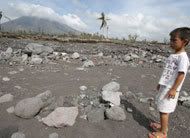Philippines: government should use biofuel profits to fund coconut re-planting program
 Rep. Juan Miguel Zubiri, the congressman who drafted the Philippines' biofuel legislation, has urged the government to set aside the money it saved from the use of coco methyl-ester (biodiesel) to replant coconut plantations in copra-producing regions, like Bicol, that were hard hit by a series of typhoons last year (see UNICEF's assessment). Because indeed, biofuel crops are fragile. They are prone to diseases, pests, climatic factors and, in the case of coconut palms, typhoons. In most cases, these risks can be mitigated relatively easily, making energy plantations safe. But natural disasters like the typhoons in the Philippines, show that even for bioenergy, the risk of supply disruptions is always present.
Rep. Juan Miguel Zubiri, the congressman who drafted the Philippines' biofuel legislation, has urged the government to set aside the money it saved from the use of coco methyl-ester (biodiesel) to replant coconut plantations in copra-producing regions, like Bicol, that were hard hit by a series of typhoons last year (see UNICEF's assessment). Because indeed, biofuel crops are fragile. They are prone to diseases, pests, climatic factors and, in the case of coconut palms, typhoons. In most cases, these risks can be mitigated relatively easily, making energy plantations safe. But natural disasters like the typhoons in the Philippines, show that even for bioenergy, the risk of supply disruptions is always present. Typhoons are not uncommon in the Philippines, but last year's storms were exceptionally intensive. Some see them as the result of global warming. So this is the situation we face: bioenergy and biofuel production is one of the safest, most effective strategies in combating climate change, but as we go ahead with implementing vast bioenergy programs, they might get affected negatively by the damages caused by what we are trying to fight...
The regions of Bicol, Eastern Visayas and Southern Tagalog account for a third, or 1 million hectares, of the 3.11 million hectares of land planted with coconut trees in the island state. Collectively, they account for 22 percent of the almost 2.5 million metric tons of annual copra production.
But three typhoons, Milenyo, Reming and Senyang whiped out some 365,000 hectares of the plantations, which is why some are calling for a "coconut rescue program".
"Bicol’s economy and future are linked to coconut. Copra is what lubricates the regional economy," said Zubiri, noting that the country is inching toward the mandatory sale of diesel blended with 1-percent coconut oil-derived biodiesel.
Zubiri said the government should earmark a portion of the fees and taxes collected from the production and sale of coco-diesel to rehabilitate coconut farms in the affected regions.
We need to guarantee the future supply of coco-diesel. The best way to do it is ensure that primary sources are made sustainable. -- Rep. Juan Miguel Zubiri, main author of the recently signed Biofuels Act.He noted that with coconut soon fueling diesel cars in the country, a percentage of government income from the sale of coco-diesel should be plowed back for re-planting coconut:
 biodiesel :: biomass :: bioenergy :: biofuels :: energy :: sustainability :: plantations :: coconut :: natural disasters :: bioenergy supply risks :: Philippines ::
biodiesel :: biomass :: bioenergy :: biofuels :: energy :: sustainability :: plantations :: coconut :: natural disasters :: bioenergy supply risks :: Philippines :: The landmark Bio-Fuels Law of 2007 requires the mandatory blending upon the effectivity of the Bio-Fuels Act’s implementing rules.
Zubiri said with the projected sale of 657 billion pesos (€10.4/US$13.5 billion) worth of bio-fuels based on current levels of fuel consumption, an estimated 29 billion pesos (€460/US$595 million) will be saved by the government.
“That alone is a already an incentive for the government to undertake a coconut re-planting program, so we can help the coconut farmers, the motorists, and the environment because coco-diesel is a clean fuel,” said Zubiri.
 -------------------
-------------------
 Spanish company Ferry Group is to invest €42/US$55.2 million in a project for the production of biomass fuel pellets in Bulgaria.
The 3-year project consists of establishing plantations of paulownia trees near the city of Tran. Paulownia is a fast-growing tree used for the commercial production of fuel pellets.
Spanish company Ferry Group is to invest €42/US$55.2 million in a project for the production of biomass fuel pellets in Bulgaria.
The 3-year project consists of establishing plantations of paulownia trees near the city of Tran. Paulownia is a fast-growing tree used for the commercial production of fuel pellets.









0 Comments:
Post a Comment
Links to this post:
Create a Link
<< Home